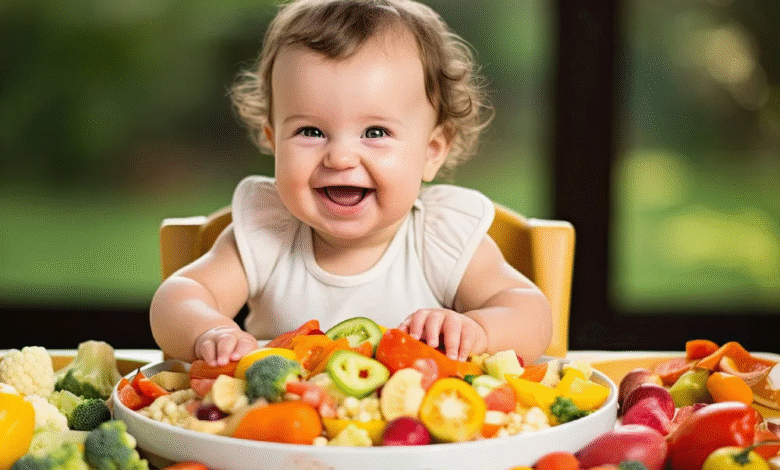Healthy Breakfast Ideas for Babies Starting From Six Months

Introducing solid foods is an exciting milestone in your baby’s first year. Breakfast is an important chance to provide essential nutrients. It also helps establish healthy eating habits from the start.
For babies starting from six months, meals need to be not only nutritious but also easy to digest and safe for their developing systems.
This guide helps you balance breakfasts for babies from six months onwards, tips for preparing meals, and ways to make breakfast both enjoyable and safe for your little one.
Why Breakfast Matters for Babies
Breakfast sets the tone for the day, even for infants. Offering a balanced morning meal helps supply energy for growth and development, supports brain function, and introduces your baby to a variety of tastes and textures.
Early exposure to healthy foods can encourage positive eating habits that last a lifetime. For babies, breakfast doesn’t have to be complicated. Even simple combinations of fruits, cereals, and proteins can provide the essential nutrients they need.
Nutritional Considerations for Babies Starting Solids
When your baby begins eating solids around six months, their diet should complement breast milk or formula. Focus on:
- Iron-rich foods: Iron-fortified cereals, puréed meats, or lentils.
- Healthy fats: Mashed avocado, full-fat yoghurt, or nut butters (if age-appropriate and safe).
- Fibre: Soft fruits and vegetables can help support digestion.
- Vitamins and minerals: Variety is key to ensure a balanced intake.
Introducing a mix of flavours and textures at this stage can also reduce fussiness later on and help your baby enjoy a wide range of foods.
Simple Breakfast Ideas for Six-Month-Olds
For babies starting at six months, meals should be soft, smooth, and easy to swallow. Here are some ideas:
- Mashed banana or avocado: Naturally soft and rich in nutrients.
- Oat or rice cereal: Iron-fortified cereals mixed with breast milk or formula.
- Puréed fruits: Apples, pears, or peaches can be gently cooked and blended.
For more inspiration, you can explore top 10 favourite brekkie ideas for 6 months, which includes easy-to-make options packed with nutrients and taste. These ideas help busy parents create safe, wholesome breakfasts without stress.
Progressing Breakfasts as Babies Grow
As babies develop stronger chewing skills and more teeth, breakfast textures and options can gradually expand. By around eight to ten months, you can introduce soft finger foods, small pieces of cooked vegetables, and soft scrambled eggs.
Mixing puréed foods with small chunks encourages self-feeding. It also improves motor skills and helps your baby become more independent. Always supervise and ensure foods are cut to safe sizes.
Breakfast Ideas for Nine to Ten-Month-Olds
By nine to ten months, babies are often ready for more variety and finger foods. Soft pancakes, mini muffins, or small pieces of toast can make breakfast more interesting. You can also combine foods, such as yoghurt with mashed fruit, or porridge with soft fruit pieces.
For a wider range of ideas tailored to older babies, check out this guide on top brekkie ideas for 10 months. It provides practical suggestions for busy parents to keep breakfasts nutritious and engaging as your baby grows.

Tips for Preparing Healthy Baby Breakfasts
- Plan Ahead: Preparing breakfast ingredients in advance can make mornings smoother. Simple batch cooking of fruits or cereals saves time.
- Keep It Balanced: Include a mix of carbohydrates, protein, and healthy fats to support growth.
- Introduce Flavours Gradually: Offering new foods one at a time helps you identify allergies and allows your baby to explore different tastes.
- Keep Safety in Mind: Always ensure foods are soft, cut into small pieces, and supervised during mealtimes.
Encouraging Healthy Eating Habits
Breakfast is a great opportunity to encourage positive eating behaviours. Offer a variety of colours, textures, and tastes to stimulate interest. Involve your baby in mealtime routines by letting them touch and explore their food safely. Praise attempts to self-feed to build confidence and independence.
Remember, babies may be fussy initially. Repeated exposure without pressure often helps them accept new foods over time. Consistency and patience are key to developing lifelong healthy habits.
Hydration and Drinks
Alongside breakfast, ensure your baby is getting adequate fluids. Breast milk or formula remains the main source of hydration for babies under 12 months. For older infants, small amounts of water can be offered in a cup during breakfast to encourage independent drinking habits.
Making Breakfast Enjoyable
Creating a relaxed and positive environment during breakfast helps your baby associate mealtimes with enjoyment. Avoid distractions like screens, and try to sit together as a family whenever possible. Engaging your baby in conversation about textures, colours, and tastes can make mealtimes educational as well as fun.

Preparing for the Next Stage
As your baby approaches one year, breakfasts can start to resemble small family meals. Introducing a wider variety of fruits, vegetables, cereals, and proteins helps transition them to more independent eating. Structured routines combined with creative meal ideas encourage healthy growth and positive eating behaviours.When you’re looking for more guidance, recipes, and inspiration for feeding your little one, Piccolo offers a range of practical tips to support parents at every stage of weaning and toddler nutrition.




